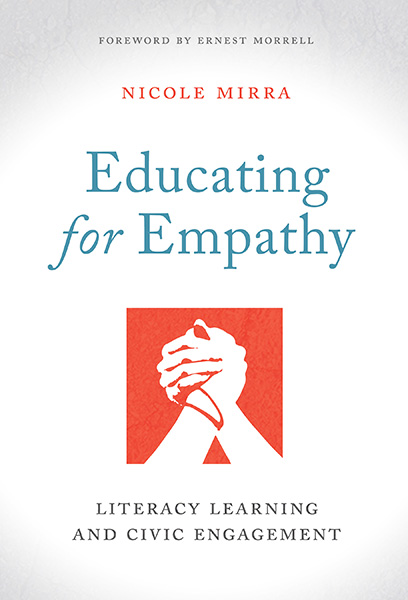Professors: Request an Exam Copy
Print copies available for US orders only. For orders outside the US, see our international distributors.
Foreword by: Ernest Morrell
Publication Date: August 31, 2018
Pages: 160
Series: Language and Literacy Series

Recipient of the 2019 NCTE David H. Russell Award!
Educating for Empathy presents a compelling framework for thinking about the purpose and practice of literacy education in a politically polarized world. Mirra proposes a model of critical civic empathy that encourages secondary ELA teachers to consider how issues of power and inequity play out in the literacy classroom and how to envision literacy practices as a means of civic engagement. The book reviews core elements of ELA instruction—response to literature, classroom discussion, research, and digital literacy—and demonstrates how these activities can be adapted to foster critical thinking and empathetic perspectives among students. Chapters depict teachers and students engaging in this transformative learning, offer concrete strategies for the classroom, and pose questions to guide school communities in collaborative reflection.
Book Features:
Nicole Mirra is an assistant professor of urban teacher education at Rutgers, The State University of New Jersey, Graduate School of Education.
"Nicole Mirra has provided an important addition to the teaching literature that will help teachers address daunting problems with civil discourse that have surfaced in the United States"
—Teachers College Record
“ Educating for Empathy gives readers a concrete range of ideas and resources that they can incorporate into their classrooms to create a space where critical civic empathy and literacy development are synthesized.”
—NCTE English Education
“Mirra’s book serves as a testament to the complex and political nature of education, while still providing hope to those teachers, teacher educators, and researchers who endeavor to teach for justice”
—Journal of Language and Literacy Education (JOLLE)
"Very highly recommended for school district, college, and university library Teacher Education collections and supplemental studies lists."
—Midwest Book Review
“At a time when civil discourse and civic life are deteriorating, Nicole Mirra’s book is welcome indeed. This passionate, engaging book will inspire not only secondary teachers of English, but all teachers throughout the K–12 years and beyond to encourage civic engagement and address the widespread absence of empathy for those different from us. Equally accessible and theoretical, Educating for Empathy describes mindsets and specific teaching practices that embody what it means to educate for empathy. If educators were to follow Mirra’s model of critical civic empathy, we will have come a long way toward educating and motivating young people to become involved, engaged, and caring citizens.”
—Sonia Nieto, professor emerita, University of Massachusetts, Amherst
“In Educating for Empathy: Literacy Learning and Civic Engagement, Nicole Mirra demonstrates how empathy and care are not merely ‘soft’ interpersonal skills, but intellectually rigorous forms of critical discernment crucial for projects of educational equity and transformation. Deeply grounded in respectful research partnerships with youth and teachers, elegantly crafted, and ultimately hopeful, this is a book that will resonate with and inspire educators in these precarious times.”
—Gerald Campano, University of Pennsylvania, Graduate School of Education
"If ever there were a time for a book on empathy in education, the moment is now. Nicole Mirra's book highlights some of the practical benefits of empathy for literacy educators and their students. Through Mirra's insightful theorizing and poignant examples of critical empathy, I am left with the hope that we can move one step closer to a more loving, empathetic, and civically engaged society.”
—Yolanda Sealey-Ruiz, Teachers College, Columbia University
Table of Contents
Foreword by Ernest Morrell
Introduction
What Is Empathy? Why Is It Important?
Empathy and English Education: Opportunities and Barriers
Moving Toward a Theory and Practice of Critical Civic Empathy
Putting Critical Civic Empathy into Practice
Orientation and Structure of the Book
Chapter 1. Warrior-Scholars and Bridge-Builders: Honing the Social Imagination Through Literary Analysis
Why Teach Literature in the English Classroom? (And What Exactly Counts as Literature, Anyway?)
From Empathy to Critical Civic Empathy: The Role of Literature
Literary Analysis in the Classroom: Teacher Case Studies
Discussion: Critical Civic Empathy in Action
Conclusion
Discussion/Reflection Question
Chapter 2. Three Sides to Every Story: Civic Communication Through Debate
Debate in Action: The Middle School Quality Initiative
Academic and Civic Benefits of Debate
Debate and Critical Civic Empathy
Debate at Unidad Middle School: A Case Study
Conclusion
Discussion/Reflection Question
Chapter 3. Who Gets to Produce Knowledge? Harnessing Youth Expertise Through Participatory Action Research
Youth Participatory Action Research in Action: Purpose, Practice, and Positioning
Youth Participatory Action Research and Critical Civic Empathy
Youth Participatory Action Research in the Classroom: My Journey
Getting Started with Youth Participatory Action Research in Various Contexts
Conclusion
Discussion/Reflection Question
Chapter 4. Navigating the Digital Public Sphere Through Connected Learning (and Teaching)
My Introduction to Connected Learning
Cultivating Connections Beyond the 21st-Century Model
From Connected Learning to Connected Teaching: A Necessary Step Forward
Activities to Jumpstart Your Journey
Conclusion
Discussion/Reflection Question
Chapter 5. Practicing What We Preach: Teachers as Civic Agent
Navigating Competing Purposes of Literacy Education
Taking a Pragmatic Approach to Fostering Critical Civic Empathy
Commitments to Democracy Inside and Outside the Classroom
Conclusion
Discussion/Reflection Question
Conclusion
The Limits of Empathy
Empathy into Action
Facing the 21st Century (and Beyond)
Appendix A: Civically Engaged Unit Planning Template
Appendix B: Template for Learning How to "Flow" in Debate
Appendix C: YPAR Research Proposal Template
Appendix D: Brief Introductions to YPAR Data Collection Strategies
Appendix E: YPAR Student Survey Model
Appendix F: Genius Hour Project Description
Appendix G: Multiple Views on the Purpose of Literacy Instruction
References
Index
About the Author
2020 Initiative for 21st Century Literacies Research Divergent Book Award for Excellence
2019 NCTE David H. Russell Award for Distinguished Research in the Teaching of English
Professors: Request an Exam Copy
Print copies available for US orders only. For orders outside the US, see our international distributors.